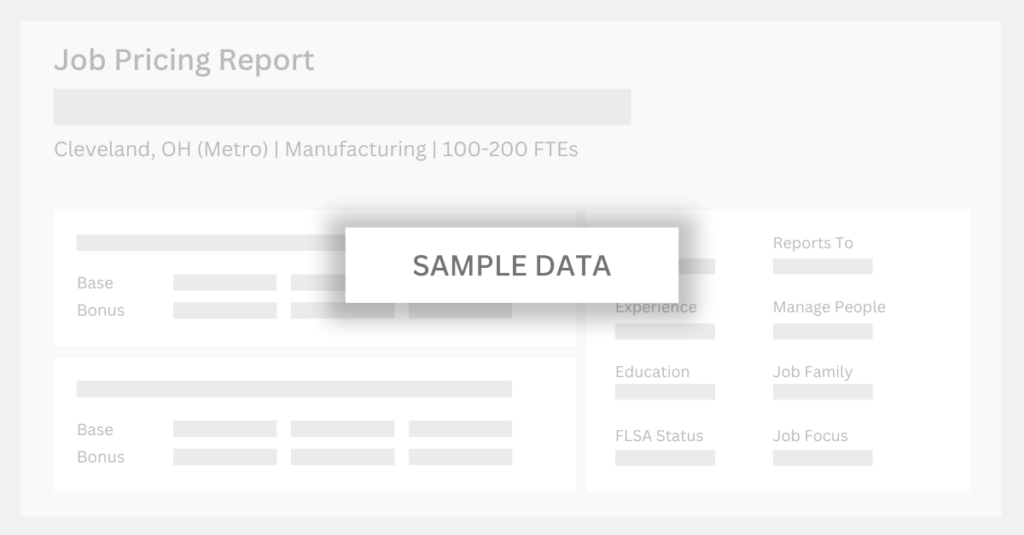Compensation Data for an Operations Manager in Ohio

Compensation data breakouts:
- Location (example: Cleveland, Akron, Ohio, National)
- Company Size (number of full-time employees)
- Industry (industry-specific or all industries)
- Years of Experience
- Education
Data included in each report:
- Base Compensation (Salary or Wage)
- Total Compensation
- Bonus
- Long-term Incentives
- Job Description
- Competencies/Skills
Get a Free Sample Report
Submit the form below to receive a sample job pricing report or to access ERC’s compensation data.

ERC is a leading provider of compensation data
Whether you’re actively recruiting and hiring or trying to stay competitive, having local salary and wage data is critical. ERC members gain access to compensation reports, job description research, and an HR Help Desk for compensation and workplace practices data.
Job Description
Overview
- Manages and coordinates organization, branch, plant, or department operation strategies and activities.
- Collaborates in the development and implementation of organization policies, practices, procedures, and attainment of operating goals.
- Reviews, analyzes, and prepares reports, records, and directives, and confers with managers/supervisors to obtain data required for planning activities, such as new commitments, status of work in progress, and problems encountered.
- Assigns, or delegates responsibility for, specified work or functional activities and disseminates policies and objectives to supervisors/staff.
Typical Functions
- Organizes resources to ensure effective production of goods and/or services.
- Gives work direction, resolves problems, prepares schedules, and sets deadlines to ensure timely completion of work.
- Evaluates current procedures and practices for accomplishing department objectives to develop and implement improved procedures and practices.
- Ensures adequate training of staff and employee compliance to organization’s policies and practices.
- Coordinates activities of department with related activities of other departments to ensure efficiency and economy.
- Monitors and analyzes costs and prepares department budget.
- Prepares reports and records on department activities for management.
- Managers are designated according to functions, activities, or type of department managed.
- May initiate or authorize employee hire, promotion, discharge, or transfer.
Similar Positions
There are several positions that share similar responsibilities to an Operations Manager, including:
- Operations Director
- Operations Supervisor
- General Manager
- Plant Manager
- Supply Chain Manager
- Business Operations Manager
- Warehouse Manager
- Service Delivery Manager
Experience and Education
An Operations Manager should have a strong background in operations management, including knowledge of supply chain management, production processes, and inventory management. They should possess leadership and management skills, along with problem-solving abilities, and the capacity to make informed decisions. Effective communication, collaboration, and analytical thinking are crucial, as well as a continuous improvement mindset.
Industry-specific knowledge and technical skills relevant to the organization’s operations may also be required. The specific experience needed can vary depending on the organization and the level of the Operations Manager position.
Competencies and Skills
- Leadership and team management
- Operations knowledge
- Problem-solving and decision-making
- Communication and collaboration
- Project management
- Process improvement
- Vendor management
- Regulatory compliance
Why ERC Compensation Data?
Through frequent polls and surveys, ERC offers a comprehensive collection of recent, reliable data covering workplace practices, employee compensation, benefits, wages, and salaries from local, regional, and national samples.
While “free” compensation data can be found on the web, here’s why you should be cautious:
- Validity — Often “free” salary data is collected from anyone willing to participate or share information. This means you don’t have a good sense of how big the sample size is, the geography of the data, or the type or size of organizations from which the data is being collected.
- Recency — ERC’s survey data relies on regular and consistent participation to ensure that the data is recent, while “free” pay data sources may provide data that is many years old.

